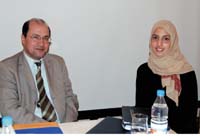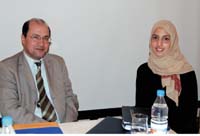
Al-Jazeera top news editor Samir Khader: “I’m a soldier at the service of the community” [Archives:2008/1160/Reportage]
May 2 2008
 |
Samir Khader, a Jordanian journalist who leads the Al-Jazeera Arabic language television news channel, was in Sana'a for six days to lead an investigative journalism workshop for members of the Yemeni media.
In cooperation with a group of nongovernmental organizations, the Al-Jazeera Training Center held the workshop at the Taj Sheba hotel in Sana'a from May 24-29. Funding for the training was provided by the United States Agency for International Development, or USAID.
With nearly 30 years of experience in the media, Khader has been employed by Al-Jazeera since 1998 and is in charge of nearly all news and special coverage for the channel.
He and 20 Yemeni journalists worked on research, interviewing, writing techniques and investigative ethics. Khader spoke with the Yemen Times regarding his thoughts about the Yemeni media, female journalists and why it's worth risking his life in order to deliver the news.
What is your evaluation of this investigative journalism workshop you led for members of the Yemeni media?
This is a really good start for the Yemeni journalism syndicate in terms of taking care of young journalists and exposing them to experiences from other parts of the world in order to learn more about investigative journalism, which isn't well-known in the Arab world, although it's the core of journalism.
The [Yemeni] journalists were terrific and eager to learn. They obviously believe in their mission in life. They want to do something; however, they still lack many things, including a solid background and discipline, in addition to training. It's not enough to go to university and graduate with a degree. You must observe what others do because it's really important to mix cultures. When I say “cultures,” I mean journalistic cultures.
You have to benefit from what others do, learn why they do it and then decide whether you can apply this in your own context and environment – what you can take from it and what you can reject. This is really important in order to build a solid experience.
Are you saying Yemeni journalists lack experience?
Of course, it's experience that matters. At university, you have only theories; you don't have practice, so they need to practice more.
In addition to practice, it's also a matter of knowledge and education. A journalist is someone who knows something about everything, but not necessarily everything about something. No university can give you that. You have to build it yourself; it's self-education.
We should be convinced that this [journalism] is our mission in life, always reminding ourselves that we have a message. True journalism means remaining neutral – of course, not 100 percent because that doesn't exist – but at least balanced. We should strive to do this every day, hour and minute until it's accomplished.
What do you think of the state of the media in Yemen?
Media is a general term. In Yemen, you only have government television and radio. You have many newspapers, some daily and some weekly. The Yemeni media resembles media in many Third World countries 20 years ago and it still lacks many things.
However, you have something that few countries have – motivated journalists. These journalists must build for the future, but you can't build the future depending on your own desires and practices. I think these journalists first need experience and exposure. Journalists here are the basis for any good future for this country. Also, it's really good to have a variety of press in this country, all coexisting with each other, whether they're governmental, opposition or independent [news sources]. Journalists here must know that it's ok to work at a newspaper belonging to one of the political parties. However, they should accept each other's viewpoints because pluralism is really important. I've met journalists here who have the idea that because they work for a certain newspaper belonging to one of the parties, they must be completely attached to this newspaper and its point of view. You can attack others – and this is your right – but be nice sometimes.
You've been to Yemen before. Do you find any changes here since your last visit?
I've been to Yemen dozens of times; the last time I came was four years ago. Of course, [there are] big differences! A society that doesn't change over the course of a year is considered a dead society, whereas Yemeni society is a vibrant society. I see a big difference in the streets, cars and buildings.
Many people consider investigative journalism a place for only men, with some maintaining that it's a dangerous field for women. Do you agree?
Of course not! This is a one-sided view of the term journalism because journalism is one of the rare fields where women can beat men in all areas. There's no such thing as women working only in “general” journalism and not investigative journalism. Investigative journalism simply means going out into the field and building a story from scratch. In fact, you're doing it right now and you're a woman!
Women can do better than men, even in conflict zones. At Al-Jazeera, many of our journalists in conflict zones are women. For example, two years ago when we covered the war in Lebanon, one of our best journalists there was a woman named Katia Nasir.
You've covered several wars. Can you tell us about your experience and how many wars you've covered as a reporter?
Covering a war is like covering any other world event, apart from the fact that you have to consider the risks, asking yourself whether you're ready for those risks. Other than that, it's a story like any other.
Of course, you sometimes have to be willing to live in difficult situations. For example, you might not find a bed, so you may have to sleep on the street or in the bushes. The risks sometimes might involve being shot and you have to accept that. However, if you believe in God and that your life is in His hands, nothing [else] is important.
I've covered the Iran-Iraq war, the Bosnian war, the U.S. invasion of Somalia, the first Gulf War between the United States and Iraq in 1991, the 2003 [U.S.] invasion of Iraq and the 2006 war in Lebanon between Hezbollah and Israel.
Do you think it's worth it to risk your life in such ways?
Of course it is. Do you think it's worth it for a soldier to risk his life?
Do you see yourself as a soldier?
I'm a soldier at the service of the community.
Do you regret anything you did while covering these wars?
Of course not. No one should regret anything because you can benefit from everything you've done. Even if you make mistakes, you can still learn from them. If you should happen to do great things, you should ask yourself what were the elements of success in order to transmit them to the next generation.
What's your biggest challenge as a journalist?
The challenge facing every journalist is to remain neutral in all conflicts. Your heart always leads you to one side or the other, but you must struggle to remain neutral because this is the basis of journalism.
Obviously, there are differences between Arab and Western media. Having worked on both sides, what are the main differences you notice?
At the time, those in the West practiced sound journalism, which is real journalism, but in the Arab world, we practiced something we called journalism, but it wasn't really journalism.
However, I'm now honored to be part of the first experience of true journalism in the Arab world because Al-Jazeera functions exactly like any good Western media outlet. Like many of my Al-Jazeera colleagues who worked in Western media for a time, we took that experience and tried to prove to everyone that we can do the same in the Arab world.
Some said Arabs couldn't produce professional media, but we proved them wrong! And we aren't the only ones, as other channels and newspapers now are doing the same. We now have print media in the Arab world that are just like the Washington Post and the New York Times, i.e., Al-Hayat newspaper.
As an Arab citizen, what is your dream?
That one day, just like the United States, we'll have the United Arab States. Just imagine what could happen! I think my generation failed, so it's now your generation's turn to try.
Amid the current situations, do you still see hope?
If it was easy, we would've done it straight away. I know it's not easy, but at least I did my share of the work. It's now your turn to do your share and transfer that to your children and so on. I'm sure we'll achieve it one day, but the sooner the better, of course.
——
[archive-e:1160-v:18-y:2008-d:2008-05-02-p:report]


